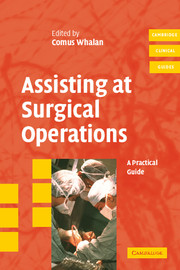Book contents
- Frontmatter
- Contents
- Contributors
- Foreword
- Preface
- PART I Introduction to the operating theatre
- PART II The operation itself
- PART III Assisting at special types of surgery
- 11 Cardiothoracic surgery
- 12 Laparoscopic surgery
- 13 Neurosurgery
- 14 Obstetric and gynaecological surgery
- 15 Ophthalmic surgery
- 16 Orthopaedic surgery
- 17 Otorhinolaryngology-head and neck surgery
- 18 Paediatric surgery
- 19 Plastic surgery and microsurgery
- 20 Surgery in difficult circumstances: (1) Rural hospitals
- 21 Surgery in difficult circumstances: (2) Developing countries
- 22 Vascular surgery: (1) Open surgery
- 23 Vascular surgery: (2) Endovascular surgery
- PART IV Immediately after the operation
- Glossary
- Suggested further reading
- References
- Index
21 - Surgery in difficult circumstances: (2) Developing countries
Published online by Cambridge University Press: 18 December 2009
- Frontmatter
- Contents
- Contributors
- Foreword
- Preface
- PART I Introduction to the operating theatre
- PART II The operation itself
- PART III Assisting at special types of surgery
- 11 Cardiothoracic surgery
- 12 Laparoscopic surgery
- 13 Neurosurgery
- 14 Obstetric and gynaecological surgery
- 15 Ophthalmic surgery
- 16 Orthopaedic surgery
- 17 Otorhinolaryngology-head and neck surgery
- 18 Paediatric surgery
- 19 Plastic surgery and microsurgery
- 20 Surgery in difficult circumstances: (1) Rural hospitals
- 21 Surgery in difficult circumstances: (2) Developing countries
- 22 Vascular surgery: (1) Open surgery
- 23 Vascular surgery: (2) Endovascular surgery
- PART IV Immediately after the operation
- Glossary
- Suggested further reading
- References
- Index
Summary
Surgical work in the developing world can be one of the most rewarding experiences in a surgical career. You are an essential component of an essential team, in an area where medical resources are scarce or minimal. Almost without exception, your contribution will be highly valued. You will be making a difference. The experience can also be very frustrating. Frustrating, because you will generally be operating under less than ideal circumstances, and will not always be able to achieve what is possible in the developed world.
This chapter is written primarily for assistants who normally work in the developed world, and plan to work in a developing country either on a short-or long-term basis. It describes the overall nature of surgery and assisting in such circumstances, rather than on techniques for assisting at individual procedures. Points for consideration have been divided into those of a general nature and those more specific to assisting.
General considerations
Standards
For those of us who work primarily in the developed world, perhaps the most difficult concept to accept is that standards of care in developing countries will differ from those we are used to ‘at home’. For example, surgical sterility is very hard to achieve in any developing world setting. There are several reasons for this. Theatre linen will probably be old and in short supply. The linen may not be correctly washed between cases to the standards to which we are accustomed. Sterilisation techniques may not render it completely sterile; sterilisers are expensive to run and maintain, and replacement parts may not be available.
- Type
- Chapter
- Information
- Assisting at Surgical OperationsA Practical Guide, pp. 161 - 171Publisher: Cambridge University PressPrint publication year: 2006

